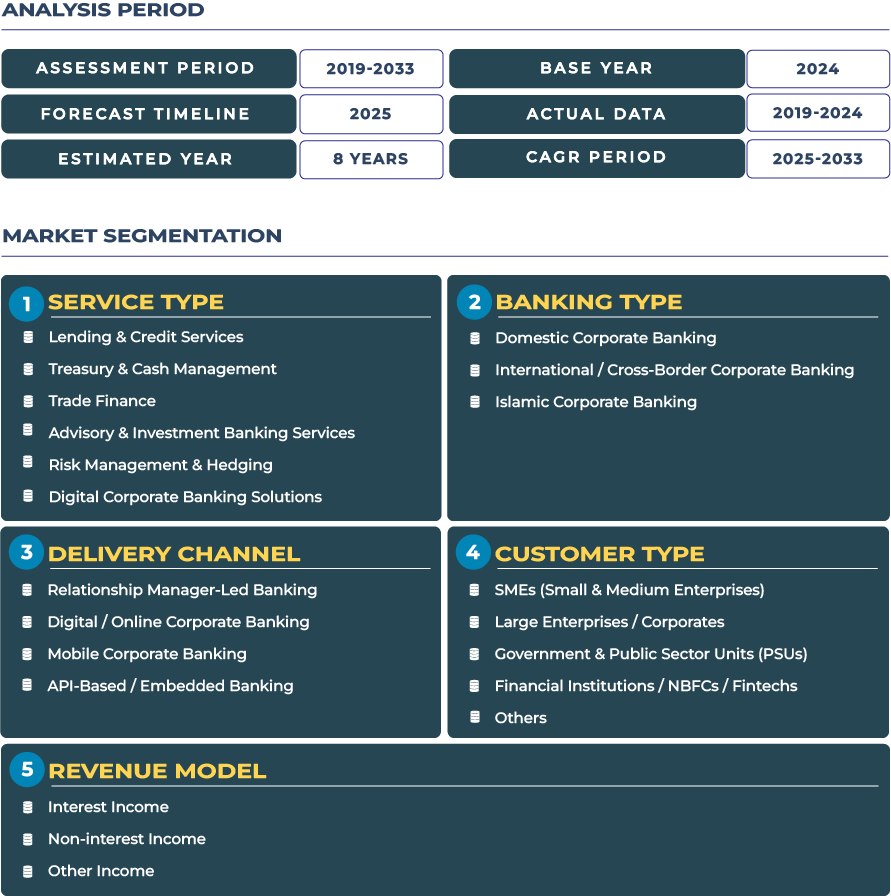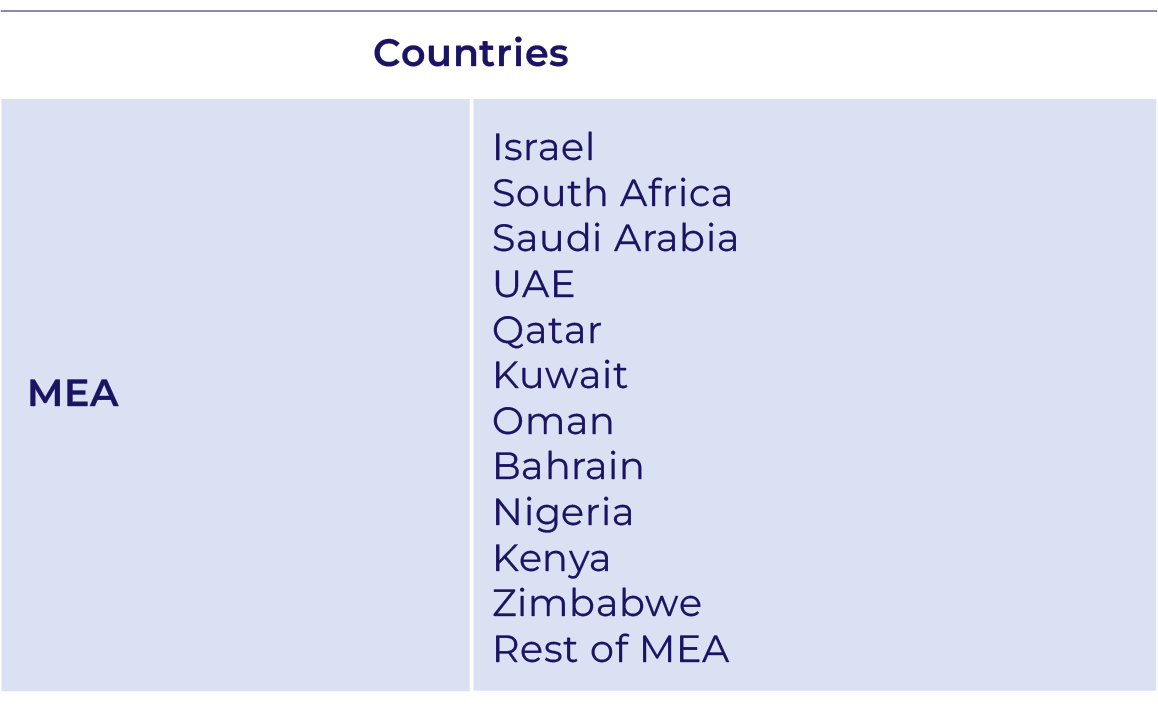Regional Corporate Banking Expansion in MEA: Enhancing Trade Finance and Cross-Border Services
The MEA (Middle East & Africa) region has emerged as a critical frontier for corporate banking expansion, driven by cross-border trade, sovereign project finance, and regional economic diversification strategies. As firms in MEA increasingly engage in intra-regional trade, they demand sophisticated solutions for liquidity, treasury, and capital optimization. The MEA corporate banking market is estimated at USD 53.9 billion in 2025 and forecast to grow to USD 59.4 billion by 2033, representing a CAGR of 1.2%. This growth is supported by rising cross-border flows, energy and infrastructure financing, and fintech-led digital innovation in trade and corporate services. Regional banks, sovereign funds, and global players are responding by deploying digital platforms, liquidity hubs, and cross-border trade finance capabilities tailored for MEA corporates.
Note:* The market size refers to the total revenue generated by banks through interest income, non-interest income, and other ancillary sources.
Drivers & Restraints: Forces Molding the MEA Corporate Banking Landscape
Driving Factors: Cross-Border Trade, Infrastructure Capital, and Islamic Finance Adoption
One of the primary drivers of the MEA corporate banking sector is the scale and complexity of cross-border trade corridors linking GCC, Africa, and Asia. Projects in energy, mining, logistics, and transportation require comprehensive trade finance, letters of credit, and receivables financing, which banks are increasingly packaging into seamless solutions. Sovereign and corporate project finance for infrastructure, such as NEOM in Saudi Arabia and energy transmission schemes, is fueling demand for long-term corporate credit, treasury services, and cash management. Another potent driver is the growth of Islamic corporate finance and sukuk issuance in MEA, which offers Sharia-compliant corporate lending and hedging alternatives. These services are increasingly in demand across corporates seeking capital aligned with regional regulatory and cultural frameworks.
Restraining Factors: Regulatory Fragmentation, Oil Dependency, and State-Linked Banking Networks
However, MEA corporate banking evolution faces headwinds. Regulatory divergence among jurisdictions (e.g., differing licensing, compliance, and capital controls) complicates cross-border banking and limits scalability of unified platforms. Many banks remain heavily state-linked, reducing competitive pressures and slowing innovation. Economic exposure to oil and commodity cycles introduces volatility: when global energy prices drop, corporate clients in affected sectors reduce demand for capital and trade facilities. Geopolitical tensions and regional instability further increase risk premiums and constrain corporate credit expansion. These factors weigh on banking institutions seeking to deploy pan-regional platforms and limited digital adoption in certain jurisdictions.
Trends & Opportunities: Innovation Areas Reshaping MEA Corporate Banking
Emerging Trends: GCC-Africa Trade Corridors, Green Financing, and Banking as a Service (BaaS)
A notable trend in MEA corporate banking is the expansion of trade finance along GCC–Africa corridors. Banks are increasingly building digital platforms that streamline cross-border payments, FX settlement, and trade documentation between the Gulf and African markets. At the same time, the region is witnessing growth in green energy project financing, especially for solar, wind, and desalination capacities, aligning corporate finance with climate goals. Another accelerating trend is Banking as a Service (BaaS), with MEA BaaS platforms growing rapidly as banks and fintechs co-deliver modular corporate banking services across jurisdictions.
Key Opportunities: Islamic Structured Finance, Corridor Trade Syndication, and Green Project Syndication
Opportunities in MEA corporate banking sector are rich. Banks can leverage Islamic structured corporate finance to attract regional corporates seeking Sharia-compliant lending. They can also build syndicated trade finance desks focused on GCC–Africa corridors to optimize liquidity for exporters and importers. Moreover, green energy and infrastructure financing syndicates offer prospects for banks to co-finance large projects under ESG criteria. As corporates increasingly demand climate-linked financing, banks that offer structured syndicated products will find competitive advantage. Local government stimulus and sovereign backing further support these initiatives.
Regional Analysis by Country
-
Saudi Arabia
Saudi Arabia is rapidly becoming a powerhouse in MEA corporate banking, with corporate lending accounting for over half of bank credit growth. Vision 2030 projects and giga-projects like NEOM are driving record demand for corporate and project finance. SAMA data shows business lending growth exceeding 20% YoY in several sectors.
-
UAE
The UAE, supported by DIFC and its regulatory regime, is a regional corporate banking hub. Banks based in Dubai are increasingly offering international cash management, trade finance, and cross-jurisdictional solutions.
-
South Africa
South Africa corporate banking market serves as a gateway to sub-Saharan Africa, with strong demand for trade finance, treasury systems, and cross-currency hedging. Corporates in mining and commodities drive bulk demand for structured finance.
-
Nigeria
Nigeria is emerging as a corporate banking frontier, with companies demanding trade finance, supplier financing, and credit services. Regulatory reforms are opening opportunities for digital corporate banking platforms.
Competitive Landscape: Leading Institutions and Strategy Execution
Key players in the MEA corporate banking space include Commercial Bank of Dubai, QNB, Al Rajhi Bank, Standard Chartered (regional desks), and National Bank of Fujairah. Commercial Bank of Dubai has expanded its corporate offerings around cash management, ESG finance, and working capital solutions. QNB and Al Rajhi deploy Islamic corporate lending and syndicated finance across the Gulf. National Bank of Fujairah focuses on treasury and cross-border trade for corporates.








